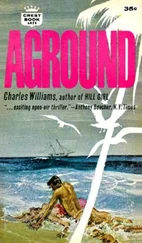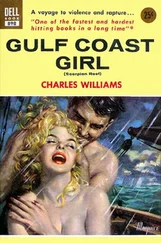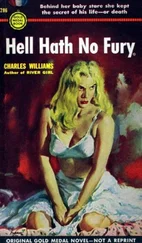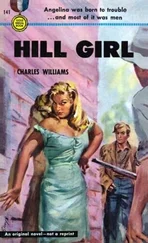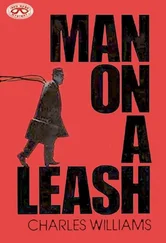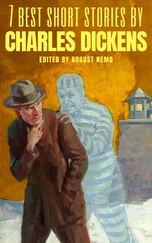Charles Williams - The Sailcloth Shroud
Здесь есть возможность читать онлайн «Charles Williams - The Sailcloth Shroud» весь текст электронной книги совершенно бесплатно (целиком полную версию без сокращений). В некоторых случаях можно слушать аудио, скачать через торрент в формате fb2 и присутствует краткое содержание. Год выпуска: 2010, Жанр: Старинная литература, на английском языке. Описание произведения, (предисловие) а так же отзывы посетителей доступны на портале библиотеки ЛибКат.
- Название:The Sailcloth Shroud
- Автор:
- Жанр:
- Год:2010
- ISBN:нет данных
- Рейтинг книги:3 / 5. Голосов: 1
-
Избранное:Добавить в избранное
- Отзывы:
-
Ваша оценка:
- 60
- 1
- 2
- 3
- 4
- 5
The Sailcloth Shroud: краткое содержание, описание и аннотация
Предлагаем к чтению аннотацию, описание, краткое содержание или предисловие (зависит от того, что написал сам автор книги «The Sailcloth Shroud»). Если вы не нашли необходимую информацию о книге — напишите в комментариях, мы постараемся отыскать её.
The Sailcloth Shroud — читать онлайн бесплатно полную книгу (весь текст) целиком
Ниже представлен текст книги, разбитый по страницам. Система сохранения места последней прочитанной страницы, позволяет с удобством читать онлайн бесплатно книгу «The Sailcloth Shroud», без необходимости каждый раз заново искать на чём Вы остановились. Поставьте закладку, и сможете в любой момент перейти на страницу, на которой закончили чтение.
Интервал:
Закладка:
“Does the name Slidell mean anything to you?” I asked
“No,” she said. I was convinced she was telling the truth. “I’ve never heard it before.”
“Do you know where he could have got that money?”
She ran despairing hands through her hair, and stood up. “No. Mr. Rogers, none of this makes the slightest sense to me. It couldn’t have been my father.”
“But you know it was, don’t you?” I said.
She nodded. “I’m afraid so.”
“Did you say he worked for a bank?”
“Yes. In the Trust Department of the Drovers National.”
“There was no shortage in his accounts?”
For an instant I thought the anger was going to flare again. Then she said wearily, “No. Not this time.”
“This time?”
She made a little gesture of resignation. “Since he may be the one who got you into this trouble, I suppose you have a right to know. He did take some money once, from another bank. I don’t see how it could have any bearing on this, but maybe it has. If you’ll wait while I shower and change, I’ll tell you about it.”
10
She brushed sand from her bare feet and opened the door at the left end of the porch. The kitchen was bright with colored tile and white enamel. I followed her through an arched doorway into a large dining and living room. “Please sit down,” she said. “I won’t be long.” She disappeared down a hallway to the right.
I lighted a cigarette and looked around at the room. It was comfortable, and the light pleasantly subdued after the glare of the white coral sand outside. The drapes over the front window were of some loosely woven dark green material, and the lighter green walls and bare terrazzo floor added to the impression of coolness. Set in the wall to the left, next to the carport, was an air-conditioner unit whose faint humming made the only sound. Above it was a mounted permit, a very large one. Between it and the front window on that side was a hi-fi set in a blond cabinet. At the rear of the room was a sideboard, and a dining table made of bamboo and heavy glass. A long couch and two armchairs with a teak coffee table between them formed a conversational group near the center of the room. The couch and chairs were bamboo with brightly colored cushions. On the other side of the room, between the hallway and the front, were stacks of loaded book shelves. Just to the right of the hallway was a massive desk on which were a telephone, a portable typewriter, several boxes of paper, and two more cameras, a Rollieflex and a 35-mm job. I walked over to the desk arid saw that it also held several trays of colored slides and a pile of photographs of Keys scenes, mostly eight-by-ten blowups in both black-and-white and color. I wondered if she’d done them, and then remembered Music in the Wind . She was an artist with a camera. Somewhere down the hall was the muted sound of a shower running.
In a few minutes she came back. She had changed to a crisp summery dress of some pale blue material, and was bare-legged and wearing sandals. Her hair, cut rather short in a careless, pixie effect, seemed a little darker than it had in the sun. Patricia Reagan was a very attractive girl. She had regained her composure somewhat, and managed a smile. “I’m sorry to keep you waiting.”
“Not at all,” I said. We sat down and lighted cigarettes.
“How did you locate me?” she asked.
I told her. “Your roommate in Santa Barbara said you were doing some magazine articles.”
She made a deprecating gesture. “Not on assignment, I’m afraid. I’m not a professional yet. An editor has promised to look at an article on the Keys, and I had a chance to stay in this house while Mr. and Mrs. Holland are in Europe. They were neighbors of ours in Massachusetts. And in the meantime I’m doing some colored slides, under-water shots along the reefs.”
“Skin-diving alone’s not a very good practice,” I said.
“Oh, I’m just working in shallow water. But the whole area’s fascinating, and the water’s beautiful.”
I grinned. “I’m a Floridian, and I don’t like to sound unpatriotic, but you ought to try the Bahamas. The colors of the water under the right light conditions almost make you hurt.”
She nodded somberly. “I was there once, when I was twelve. My mother and father and I cruised in the Exumas and around Eleuthera for about a month in a shallow-draft yawl.”
“A charter?” I asked.
“No. It was ours. He and I brought it down, and Mother flew to Nassau to join us. She always got sick offshore.”
“What was the name of the yawl?”
The brown eyes met mine in a quick glance. Then she shook her head, a little embarrassed. “Enchantress . Princess Pat was a pet name, one of those top-secret jokes between fathers and very young daughters. He was the only one who ever used it.”
“I’m sorry about all this,” I said. “But how did he get to Phoenix?”
Downhill, as it turned out. She told me, and even after all this time there was hurt and bewilderment in it. The Reagans were from a small town named Elliston on the coast of Massachusetts near Lynn. They’d always been sailors, either professional or amateur, several having been mates and shipmasters during the clipper-ship era in the 4os and 50s and another a privateer during the Revolution. Clifford Reagan belonged to the yacht club and had sailed in a number of ocean races, though not in his own boat.
I gathered his father was fairly well-to-do, though she made as little of this as possible. He’d been in the foundry business and in real estate, and owned considerable stock in the town’s leading bank and was on its board of directors. Clifford Reagan went to work in the bank when he finished college. He married a local girl, and Patricia was their only child. You could tell she and her father were very close when she was small. Then when she was sixteen the whole thing went on the rocks.
Her mother and father were divorced, but that was only the beginning. When her mother’s attorneys wanted an accounting of the community property the rest of it was discovered; he’d lost not only everything they owned gambling on Canadian mining stocks, but also $17,000 he’d taken from the bank.
“Nobody ever knew about it except the president of the bank and the family,” she said, staring down at her hands in her lap. “My grandfather made the shortage good, so he wasn’t prosecuted. The only stipulation was that he resign, and never work in a bank again.”
“But he was working in one in Phoenix,” I said.
She nodded. “Actually, there was no way anyone could stop him. It had all been so hushed up before that even the bonding company didn’t know about it. Grandfather was afraid it would happen again, but what could he do? Tell the bank out there that his own son had stolen money? And perhaps ruin the last chance he’d ever have to live it down and redeem himself?”
“But how did a man who was already past forty get a job in a bank without references?” I asked.
“A woman,” she said. “His second wife.”
Reagan had probably settled on Arizona as being about as remote from any connection with his past life as it would be possible to get and still stay on the same planet. He’d worked for a while as an account representative in a brokerage office, and soon came to know a great many people in some of the high-bracket suburbs of Phoenix. He met Mrs. Canning about that time, and married her in 1951. She was the widow of a Columbus, Ohio, real-estate developer who had bought a big ranch near Phoenix and raised quarter horses. She also owned a big block of stock in the Drovers National, so nothing could be simpler than Reagan’s going to work there if that was what he wanted to do.
The marriage didn’t last—they were separated in 1954—but oddly enough the job did. They liked him at the bank, and he worked at the job and was good at it. The distinguished appearance, quiet, well-bred manner, and the fact that he was on good terms with lots of wealthy potential customers did him no harm either. He was promoted several times, and by 1956 was in charge of the trust department.
Читать дальшеИнтервал:
Закладка:
Похожие книги на «The Sailcloth Shroud»
Представляем Вашему вниманию похожие книги на «The Sailcloth Shroud» списком для выбора. Мы отобрали схожую по названию и смыслу литературу в надежде предоставить читателям больше вариантов отыскать новые, интересные, ещё непрочитанные произведения.
Обсуждение, отзывы о книге «The Sailcloth Shroud» и просто собственные мнения читателей. Оставьте ваши комментарии, напишите, что Вы думаете о произведении, его смысле или главных героях. Укажите что конкретно понравилось, а что нет, и почему Вы так считаете.

